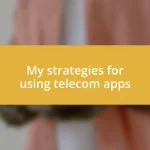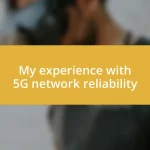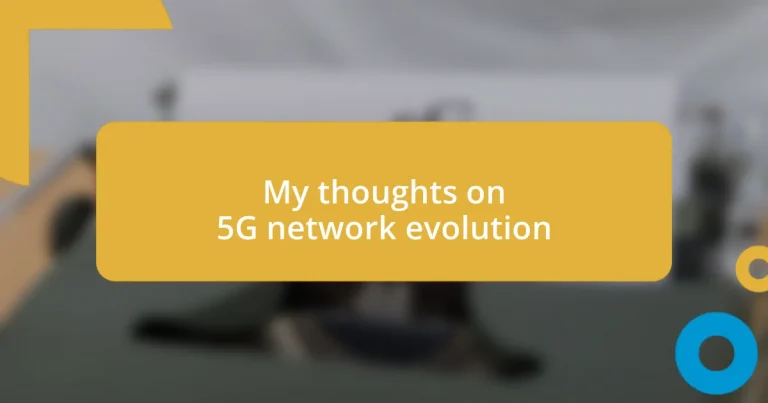Key takeaways:
- 5G technology represents a significant advancement over 4G, offering faster data speeds, lower latency, and greater capacity, which can transform various industries and enhance everyday user experiences.
- Key benefits for consumers include lightning-fast downloads, improved connectivity for smart devices, and enhanced reliability, promising a more seamless digital experience.
- 5G has the potential to boost the global economy through job creation, innovation, and improved access to services in underserved areas, while also raising the need for robust security measures against new vulnerabilities.
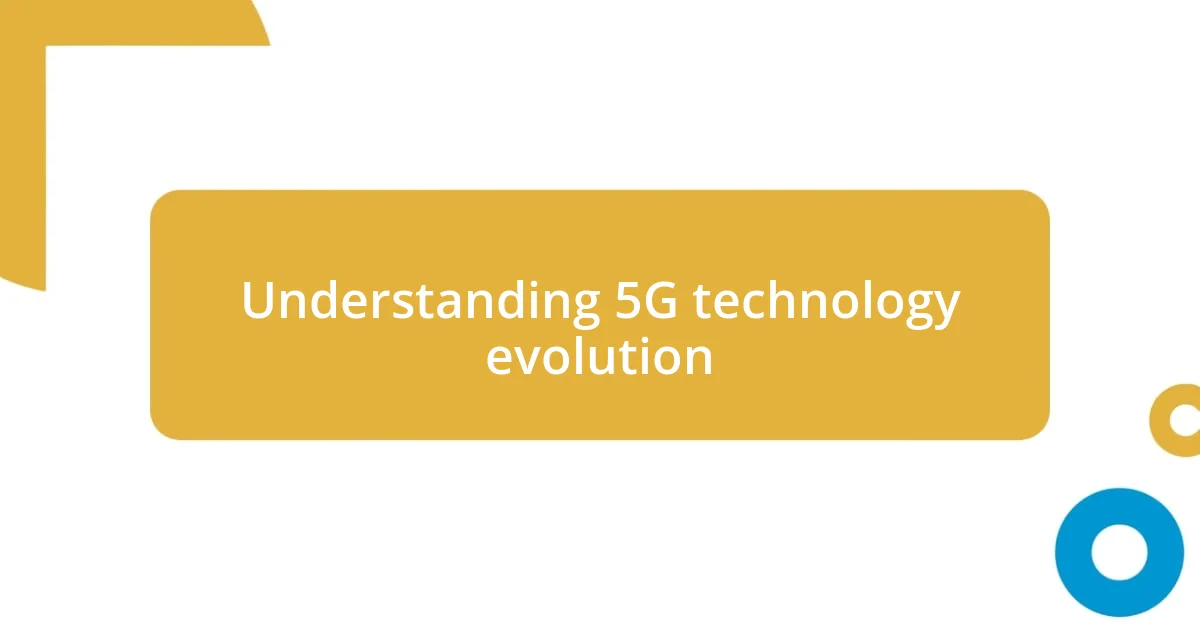
Understanding 5G technology evolution
When I first heard about 5G technology, I was skeptical. Would it really revolutionize the way we connect? As I began to delve deeper, I learned that 5G is not just an upgrade but a fundamental leap forward from its predecessors. It promises faster data speeds, lower latency, and greater capacity, all of which have the potential to reshape various industries.
I vividly remember attending a tech conference where a demo showcased the differences between 4G and 5G. Watching a live virtual reality experience run seamlessly over 5G left me in awe. It struck me just how transformative this technology could be—not just for tech enthusiasts, but for everyday users. The possibilities seemed endless, from smart cities to enhanced telemedicine.
Reflecting on my own experiences with mobile connectivity, I often found myself frustrated by slow connections during important video calls. The thought that 5G could minimize those disruptions filled me with hope. What if, instead of buffering, we could have uninterrupted video feeds? That’s the kind of evolution in technology that truly excites me and makes me eager for what the future holds.
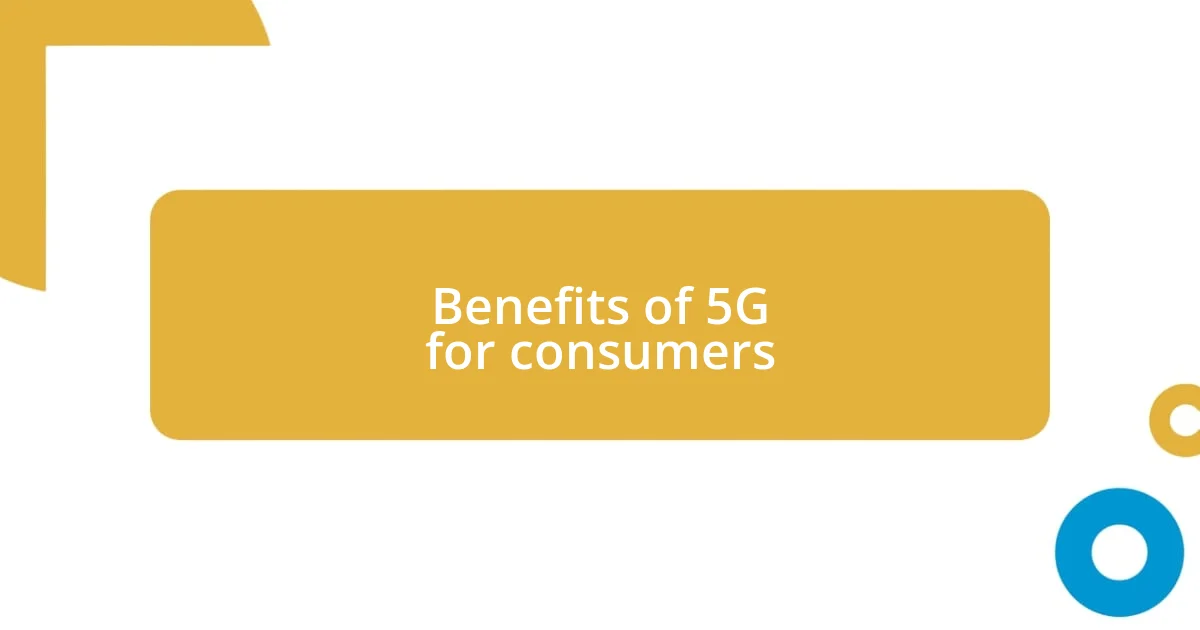
Benefits of 5G for consumers
The move to 5G brings an array of benefits that I find genuinely exciting. For starters, the enhanced speed means that I can download movies or large files in mere seconds—a game-changer when I’m pressed for time. Imagine finishing that long wait for a file to download while you prepare dinner, or even while waiting for your coffee at your favorite café.
Here are a few key benefits of 5G for consumers:
- Lightning-fast downloads: Experience speeds that are up to 100 times faster than 4G, allowing streaming and downloads without interruption.
- Lower latency: Improved response times make activities like gaming or video calls feel instantaneous, creating a smoother experience.
- Greater connectivity: With 5G, numerous devices can be connected simultaneously without sacrificing performance, perfect for smart homes packed with gadgets.
- Improved reliability: The network is more dependable, ensuring that even in crowded spaces, I can stay connected without hiccups.
I remember a time when I was stuck in traffic and wanted to catch up on my favorite show. My 4G connection struggled, and buffering made it nearly impossible to enjoy. The thought of 5G eliminating that frustration is a huge relief. I see myself effortlessly enjoying binge-watching sessions even in the most unpredictable environments thanks to 5G.
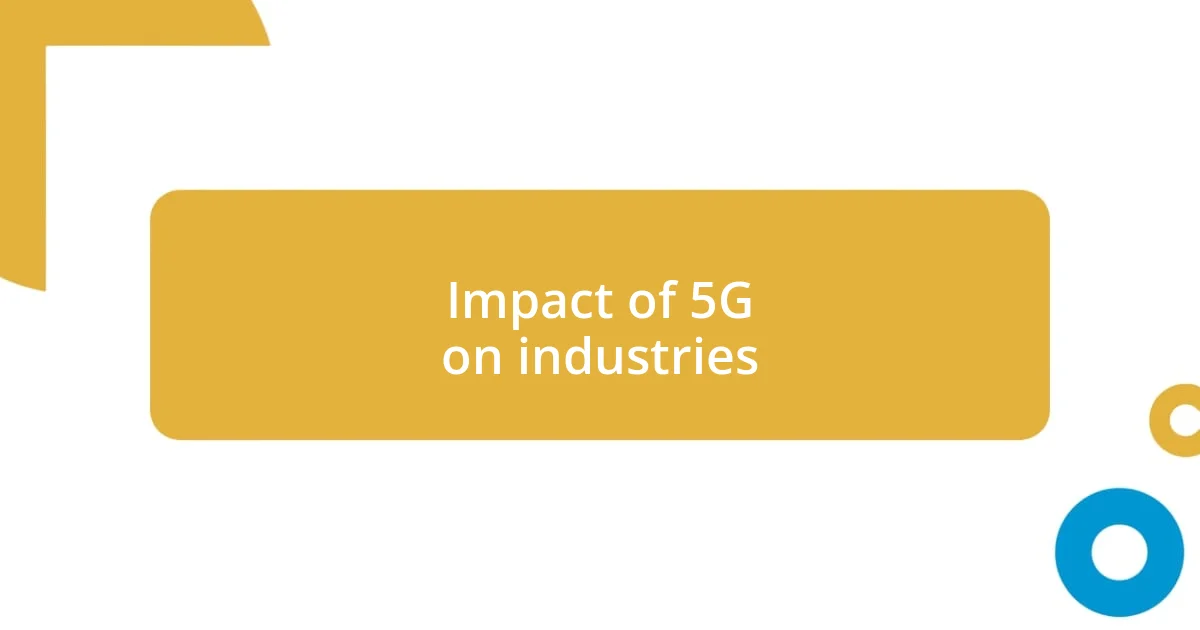
Impact of 5G on industries
The impact of 5G on industries is profound and far-reaching. Take the healthcare sector, for example. With 5G, telemedicine can reach new heights—doctors can perform remote surgeries with real-time data transmission and minimal delay. I imagine what it would be like for a specialized surgeon to operate on a patient in a remote area. The thought of saving lives without the limitations of distance is incredibly powerful.
In the realm of manufacturing, the introduction of 5G can revolutionize operations through the implementation of smart factories. These facilities can connect IoT devices that monitor and optimize processes in real time, reducing downtime and improving efficiency. I find it fascinating how, with just a slight shift in technology, an entire production line could be transformed to achieve unparalleled productivity. Witnessing this evolution sparks excitement about what’s next in the industrial landscape.
Moreover, entertainment industries are likely to see a significant shift as well. Imagine attending a live concert or sports event with a virtual reality experience that allows you to interact like never before, all due to the low latency provided by 5G. I can’t help but feel exhilarated at the thought of being part of such immersive experiences that bring fans closer to the action, even from afar.
| Industry | Impact of 5G |
|---|---|
| Healthcare | Enhanced telemedicine, enabling remote surgeries with real-time data transfer. |
| Manufacturing | Smart factories with IoT connectivity, optimizing processes and reducing downtime. |
| Entertainment | Immersive virtual experiences that redefine fan engagement at live events. |
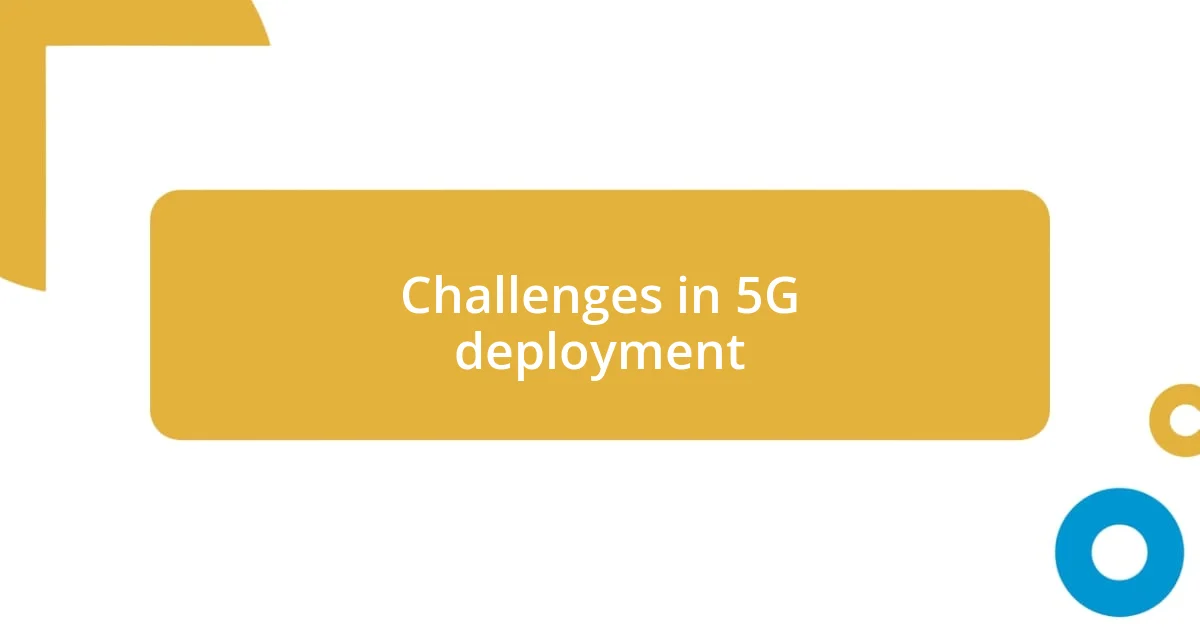
Challenges in 5G deployment
Navigating the deployment of 5G isn’t without its hurdles. One significant challenge is the infrastructure investment required. I remember when my city rolled out a new form of public transit—it seemed to take ages and involved a heavy financial burden. The same kind of strain applies to 5G, where the need for new towers and equipment can be a daunting task for many providers, particularly in rural areas where the return on investment feels uncertain.
Another factor that creates complexity is the radio frequency spectrum. In simpler terms, think of it as the airwaves that carry our data. With 5G, there’s a bottleneck of available frequencies, not to mention the interference from buildings and trees that can block signals. Reflecting back on my experiences trying to get a reliable Wi-Fi signal in a crowded café, I can truly appreciate how frustrating these challenges can become on a large scale.
Finally, public perception plays a pivotal role. Many people still voice concerns over health effects, although research has largely debunked these fears. I often wonder how the narrative might shift if we engaged the public more openly in conversations about 5G—would that help eliminate some of the skepticism? In my experience, education and transparency are crucial for fostering trust in new technologies, especially one as transformative as this.
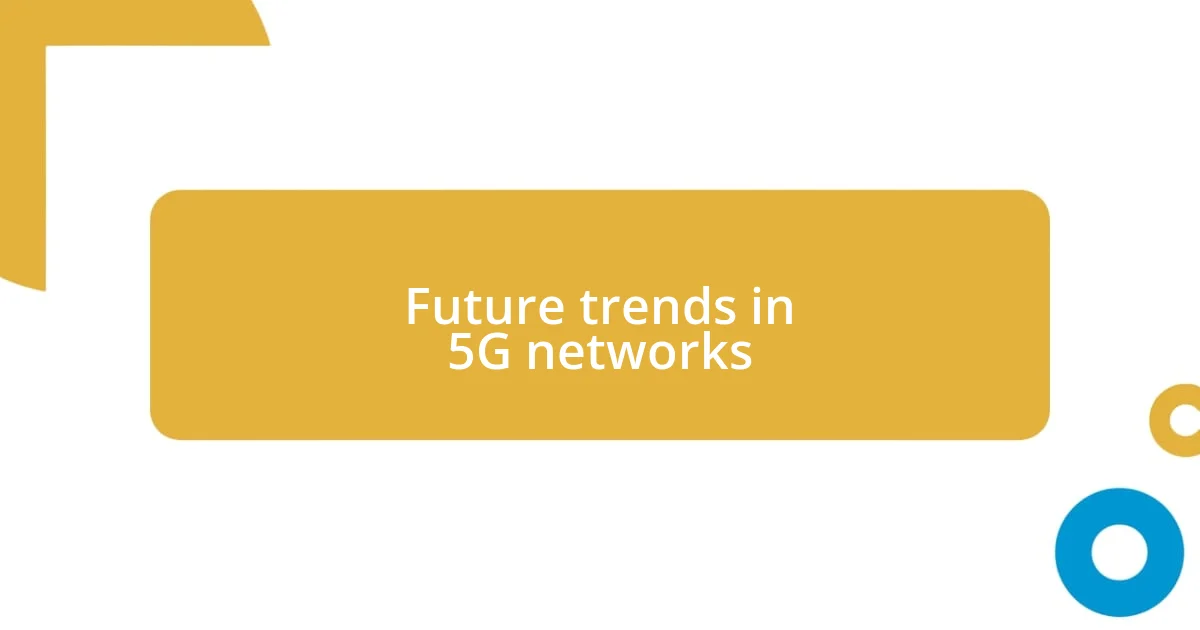
Future trends in 5G networks
As we look ahead, one future trend in 5G networks is the expansion of edge computing. With data processing moving closer to users, I envision a world where latency is nearly non-existent. Imagine watching a live-streamed event with zero lag—everything in sync, creating a truly immersive experience. Doesn’t that sound incredible?
Additionally, artificial intelligence (AI) will play a pivotal role in optimizing 5G networks. From network management to predictive analytics, I think it’s fascinating how AI can analyze data flows, detect faults, and enhance performance autonomously. When I think about the possibility of a self-healing network that can adapt and respond in real-time, I can’t help but feel a rush of anticipation about the innovations ahead.
Security will also become a pressing concern as 5G technology evolves. With increased connectivity comes heightened vulnerabilities. I sometimes wonder how our reliance on these advanced networks might expose us to new risks. However, I believe that as long as we prioritize security measures and develop robust protocols, we can navigate these challenges, paving the way for a safer digital experience.
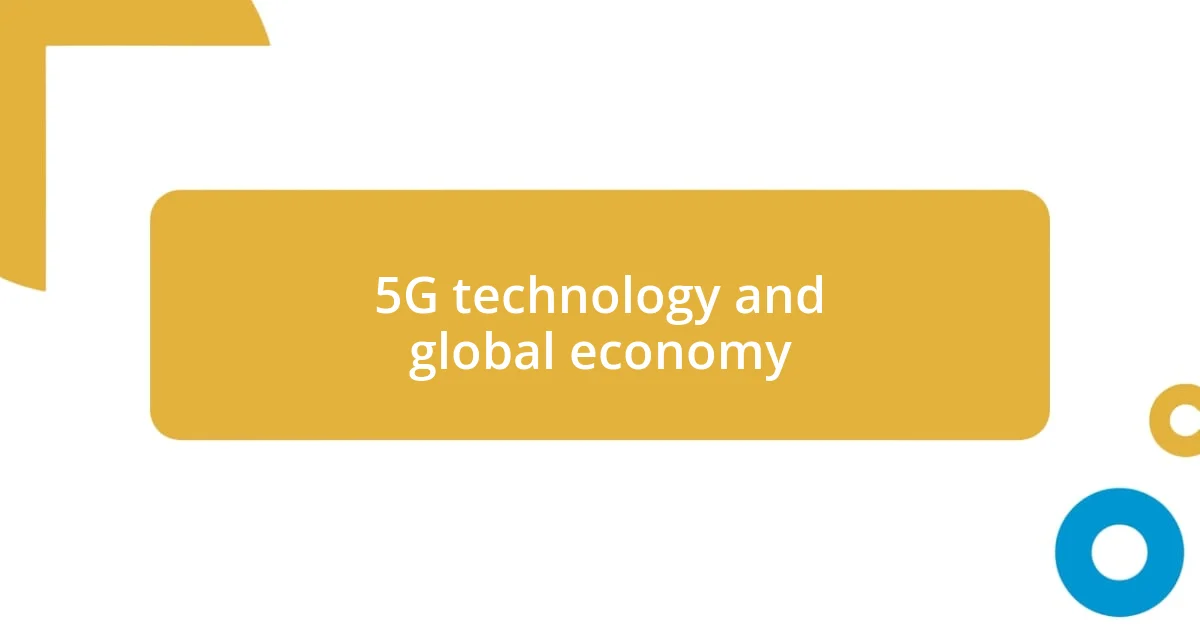
5G technology and global economy
5G technology has the potential to significantly boost the global economy, driving innovation across various sectors. I remember attending a tech conference last year where experts shared mind-blowing projections about how 5G could contribute trillions to global GDP. It’s exciting to think about how enhancements in connectivity can power everything from smart cities to advanced manufacturing. Who wouldn’t want to be part of that revolutionary wave?
The ripple effects of 5G extend to job creation as well. I think back to my early career when the advent of new technology opened doors to numerous opportunities. Similarly, as 5G networks expand, I envision countless job roles emerging—everything from network engineers to tech support specialists. But what really excites me is the entrepreneurial spirit this could unleash. Picture a startup in a small town getting the resources it needs to innovate and thrive thanks to the faster connections 5G provides. Isn’t that a thrilling scenario?
Moreover, 5G could bridge gaps in economic inequality by improving access to services in underserved areas. Reflecting on times I’ve traveled to places with limited internet, it’s clear how much these communities miss out on educational and economic opportunities. If we leverage 5G properly, we could see remarkable advancements in remote learning and telehealth, enhancing quality of life. Can you imagine how many lives might be changed simply through better connectivity? The possibilities are profound.
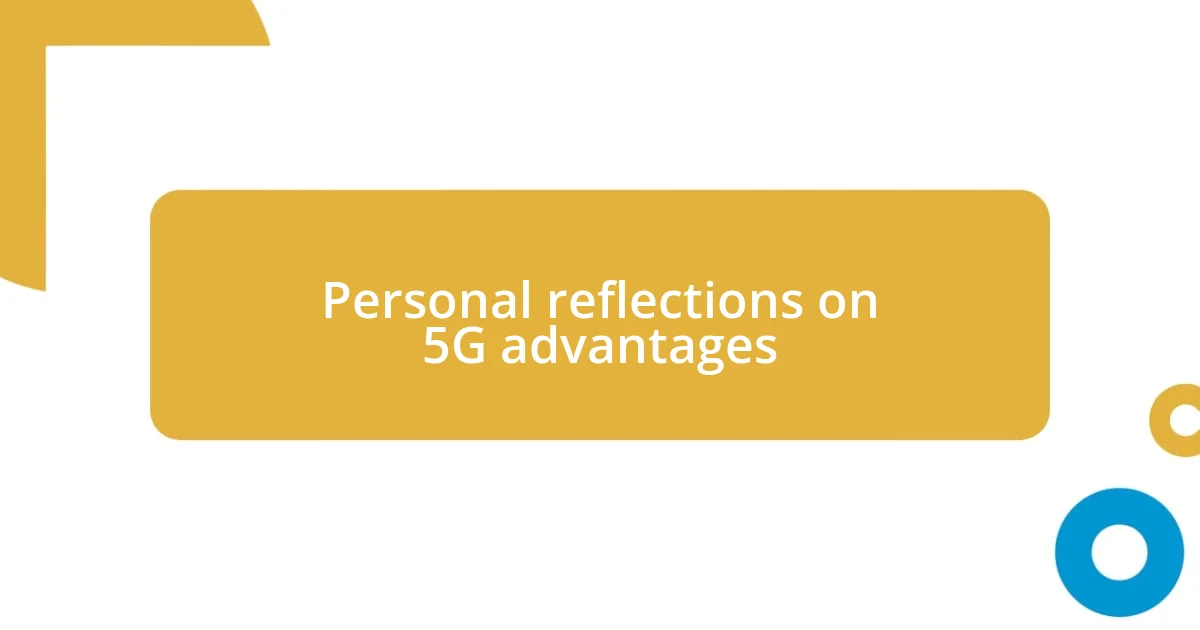
Personal reflections on 5G advantages
I find myself genuinely excited about the advantages of 5G, particularly its impact on everyday experiences. Just imagine the thrill of virtual reality gaming where every movement translates in real-time, making the experience feel almost lifelike. I recall playing with a VR headset once; the lag was a bit disorienting, but with 5G, that could become a distant memory. Doesn’t it spark your imagination to think about how immersive experiences will redefine entertainment?
I also see 5G as a game-changer for remote work and collaboration. During the pandemic, I struggled with slow internet speeds during video calls, often missing out on crucial points made by my colleagues. With 5G, seamless connections could help us communicate without interruptions. How much more effective could our meetings become if we could just focus on the content instead of the connection?
Moreover, 5G holds the promise of enhancing smart home technology. I often find myself frustrated when my smart devices don’t sync up correctly. With 5G’s faster data transmission, I envision an era of smart homes that function flawlessly. What if your home could automatically adjust lighting and temperature as you arrive, anticipating your needs without delay? The thought alone gives me a sense of comfort and excitement for the potential of this technology.







